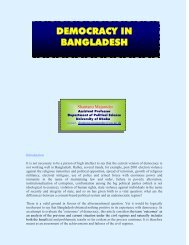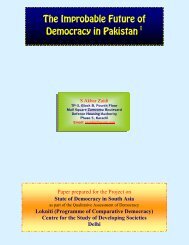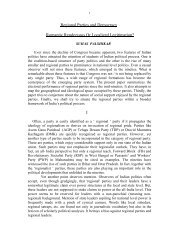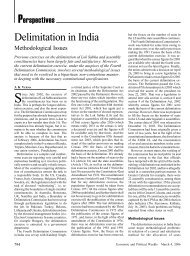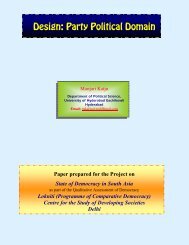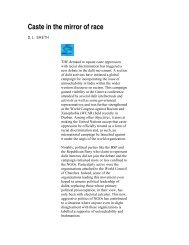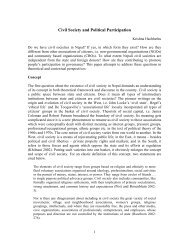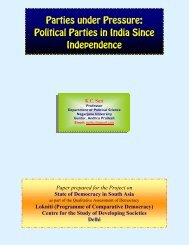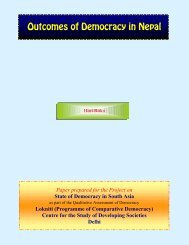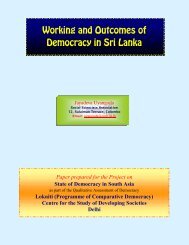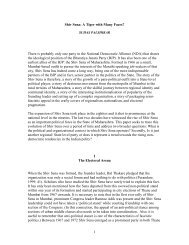Yadav A radical agenda for political reforms - Democracy Asia
Yadav A radical agenda for political reforms - Democracy Asia
Yadav A radical agenda for political reforms - Democracy Asia
Create successful ePaper yourself
Turn your PDF publications into a flip-book with our unique Google optimized e-Paper software.
A <strong>radical</strong> <strong>agenda</strong> <strong>for</strong> <strong>political</strong> re<strong>for</strong>msYOGENDRA YADAVIS there a <strong>radical</strong> <strong>agenda</strong> <strong>for</strong> <strong>political</strong>re<strong>for</strong>ms in contemporary India? Doespolitics of social trans<strong>for</strong>mation have areadily available checklist of what needs tobe done in the sphere of <strong>political</strong> institutionsand practices? Or, at the very least, does ithave a robust sense of the direction in whichto move? I wish to suggest that such an<strong>agenda</strong> is not available, even in the minimalsense of the term.The present essay begins by defending thissuggestion and exploring why we findourselves in such a sorry state. The latterhalf of the essay is an attempt to fill this gap.It offers some thoughts on how to go aboutconstructing such an <strong>agenda</strong>, or perhaps onhow not to think about <strong>political</strong> re<strong>for</strong>ms. Theessay concludes by separating what I call the‘old’ and the ‘new’ arenas of <strong>political</strong>re<strong>for</strong>ms and offering a rough checklist ofwhat needs to be done in each of these. Theprinciple ambition that underlines thisenterprise is to rehabilitate <strong>political</strong>commonsense as an appropriate mode ofthinking about <strong>political</strong> re<strong>for</strong>m.We begin to get a sense of the absence of a<strong>radical</strong> <strong>agenda</strong> on <strong>political</strong> re<strong>for</strong>ms bycontrasting it with the <strong>radical</strong> <strong>agenda</strong> on theeconomy. The latter is in no great shapetoday. The last decade has certainly shakenthe <strong>radical</strong>s out of the complacent belief thatthis <strong>agenda</strong> will be realised <strong>for</strong> them by abenign movement of history. The <strong>agenda</strong>seems to be fast disappearing from thehorizon of realisable dreams. Its empiricalassumptions and institutional expression areincreasingly under serious dispute. It turns
out that some of the critical details of this<strong>agenda</strong> were never clearly worked out.Yet there is a sense in which we stillpossess a <strong>radical</strong> economic <strong>agenda</strong>: there aresome guiding values, a sense of the directionto move towards and a shared understandingof what to welcome and what to resist. Asimilar focus on the social andenvironmental question would also bring outthe existence of such an <strong>agenda</strong>,notwithstanding all the attendantcomplications.One could argue similarly that there is a<strong>radical</strong> <strong>political</strong> <strong>agenda</strong> which <strong>radical</strong><strong>political</strong> mobilisation must aim at. But nosuch <strong>agenda</strong> is available to us on thequestion of re<strong>for</strong>ming the institutionaldesign and practices of politics so as toimprove the chances of politics yieldingwhatever we expect of it. It is unclear as towhat the <strong>radical</strong>s should stand <strong>for</strong> in thisrealm.It is not uncommon <strong>for</strong> practitioners tospeak as if everyone knows what needs to bedone. But ef<strong>for</strong>ts at spelling it out rarely gobeyond the facile consensus of a drawingroom conversation: that there is something<strong>radical</strong>ly wrong with the national enterprise,that politics is at the heart of our ills and thatit must be re<strong>for</strong>med to resurrect the wonderthat could be India. There could beagreement on some isolated items –appointing a lokpal or state funding ofelections. But the various items do not fitinto an integral whole that displays someinternal coherence, nor is there a hierarchyof significance at work in such thinking. Inthis sense there is no <strong>radical</strong> <strong>agenda</strong> <strong>for</strong><strong>political</strong> re<strong>for</strong>ms in contemporary India.
There is nothing new about this absence.The current mismatch between thesignificance attached to <strong>political</strong> re<strong>for</strong>msand the cognitive attention paid to it is hascharacterised this subject right from thebeginning. Thinking about <strong>political</strong> re<strong>for</strong>mshas been seriously debilitated from twodirections in post-independence India. Themainstream or establishment thinking hasbeen caught in the prison-house of realism.A fascination with the new Constitution andthe entire gamut of constitutional practicesprevented mainstream thinking from goingbeyond considerations of minor tinkeringwith the legal-constitutional frame. Therewas a latent anxiety, no doubt, about theinability of Indian democracy to attain the‘correct’ <strong>for</strong>m of western democraticinstitutions – the non-emergence of a twopartysystem, the non-correspondencebetween the Indian Parliament andWestminster, and so on.It must have been depressing <strong>for</strong> them, <strong>for</strong>the establishment did believe in whatRoberto Unger has described as‘institutional fetishism’, the idea that<strong>political</strong> values have a unique, single andnecessary institutional expression. In apostcolonial setting institutional fetishismmixed with an awe of the West produced aset of cognitive and practical impediments tothinking about <strong>political</strong> institutions. But thisanxiety did not result in a comprehensive setof proposals to re<strong>for</strong>m the polity.The critics of the establishment too, on theother hand, never thought carefully about<strong>political</strong> re<strong>for</strong>ms. For left-wing critics, theword ‘re<strong>for</strong>m’ always carried a tinge ofsuspicion, the fear of being caught in are<strong>for</strong>mist trap. In their worldview it madelittle sense to think about re<strong>for</strong>ming the
existing <strong>political</strong> design, <strong>for</strong> they aimed atnothing less than a complete overhaul,nothing short of revolution. The trouble wasthat the <strong>political</strong> design of the postrevolutionarystate was never attended tobeyond some vague and poetic gestures inMarx’s writings. There was little attentionpaid to how the <strong>political</strong> institutions of thefuture would relate to the existing gamut ofsocial and <strong>political</strong> institutions in a societylike India. Thinking about these subjects,like so much else, was relegated to the ‘lastinstance’ that never arrived.At the other end of the spectrum of thecritics of liberal democratic set-up, theGandhians too shared the communists’temptation to write on a clean slate.Shrimannarayan’s alternative constitution<strong>for</strong> independent India was not quite aproposal <strong>for</strong> <strong>political</strong> re<strong>for</strong>m. It was analternative design <strong>for</strong> a new polity. PerhapsJP’s ‘A plea <strong>for</strong> the reconstruction <strong>for</strong> theIndian polity’ was the only comprehensiveset of proposals <strong>for</strong> <strong>radical</strong> <strong>political</strong> re<strong>for</strong>m.In retrospect his critique looks ahead of histime. It is striking how many of the ills ofour <strong>political</strong> system were seen by him in aclimate much less conducive to discussingsuch issues.Unlike other re<strong>for</strong>mists of his time, JP didnot lack in bold imagination. What heperhaps did lack was realism, not in thesense of being non-practical and unfeasiblebut in the deeper sense of not connecting tosociological reality, of being insufficientlygrounded in a sense of power and causalityof everyday life. The village community onwhich JP rested his entire communitarianmodel may have never existed. Like thecommunists, JP was unwilling to spell out
his model in relation to the existing gamut ofmodern <strong>political</strong> institutions and practices.In that sense the Lohia-socialists weresomething of an exception. Lohia’s vision ofa chaukhamba raj or a four pillar state, wasa much less <strong>radical</strong> departure from theexisting institutions than was the case withhis other <strong>radical</strong> contemporaries. His plea<strong>for</strong> the centre, state, district and village levelgovernments as the four-pillars of adecentralized state structure anticipatesmuch of the discussion on <strong>political</strong>decentralisation in the 1990s. But, like somany of his ideas, his proposals remained inthe realm of broad gestures that were neverworked out.The challenge of thinking about <strong>political</strong>re<strong>for</strong>m fell between the two stools ofconservative constitutionalism and itsvisionary critiques. Political re<strong>for</strong>ms came tobe an area where our convictions wereinsufficiently grounded and even lesssufficiently worked out. Something of across between these two tendencies alsoaccounts <strong>for</strong> the commonsense on <strong>political</strong>re<strong>for</strong>ms that developed between theseventies and the nineties. Thiscommonsense was first articulated in thearena of electoral re<strong>for</strong>ms by the TarkundeCommittee and then in documents like AnAgenda <strong>for</strong> India (Seminar 245 & 251,January and July 1980), the DineshGoswami report on electoral re<strong>for</strong>ms and thewritings of L.P. Singh and S.L. Shakdher(see Sanjay Mishra’s article in this issue).All these ef<strong>for</strong>ts created something of aconsensus on at least some familiar items of<strong>political</strong> re<strong>for</strong>ms: thinking about aproportional or mixed electoral system as asubstitute <strong>for</strong> the first-past-the-post system,
anti-defection law, the institution of a lokpaland state funding of elections. More thanthese specific items, the commonsense alsodefined some basic attributes of thedominant thinking about <strong>political</strong> re<strong>for</strong>ms.Like the establishment and therevolutionaries, the re<strong>for</strong>mers also focusedon institutions of high national politics: thenational legislature and the executive. Theobjectives of re<strong>for</strong>m were still quitegeneralized: to clear the system of corruptpractices and to ensure free and fairelections. The favoured instrument of<strong>political</strong> re<strong>for</strong>ms was legal-constitutionalchange. At the same time it was recognisedthat these changes needed to be backed by<strong>political</strong> action.The last decade has changed all that. Thequestion of <strong>political</strong> re<strong>for</strong>m has neverenjoyed as much public attention as it did inthe last decade. Greater public attention andpriority to <strong>political</strong> re<strong>for</strong>ms did not howeverproduce a <strong>radical</strong> <strong>agenda</strong> <strong>for</strong> <strong>political</strong>re<strong>for</strong>ms. On the contrary, there has been aclear shift to a conservative <strong>agenda</strong> on<strong>political</strong> re<strong>for</strong>ms. To be sure this shift is nota direct outcome of the rise of the BJPduring the same period; the newconservative <strong>agenda</strong> is not communal. Yetthe rise of the <strong>political</strong> right makes itpossible to articulate positions that wereimpermissible earlier.The change in India cannot also be directlylinked to the changing global paradigms ofdemocracy. The global vocabulary of goodgovernance has not yet come to dominateour thinking on politics the way it has inAfrica and other parts of the Third Worldand the way its economic counterpartdominates our thinking on the economy. Yetthe intellectual climate of globalisation has
played a deep role in eroding our collectivesense of alternative possibilities in the realmof politics too. Coupled with the domesticanxieties of a highly articulate ‘middle class’(a euphemism <strong>for</strong> the urban, upper caste,consuming class in India) in a post-Mandalphase of democratic politics, best capturedin the rhetoric of Seshan or the prescriptionsof the Law Commission, this new discourseon <strong>political</strong> re<strong>for</strong>m has quietly taken overthe popular imagination. The <strong>for</strong>mation andthe preliminary output of the NationalCommission to Review the Working of theConstitution falls squarely within thisimagination.Let us look at some attributes of thisconservative perspective that dominatesthinking on <strong>political</strong> re<strong>for</strong>ms. First, it shareswith its predecessors the preoccupation withinstitutions of high politics: nationallegislature, executive, and possiblyjudiciary. There may be an occasionalreference to panchayati raj, but the principlefocus of the intellectual and practical energyis on changing the design of centralgovernment. Second, there is a universalsearch <strong>for</strong> a good <strong>political</strong> or electoralsystem with a view to importing the best<strong>political</strong> practices to India. Although there isa ritual reference to contemporarymalpractices in Indian democracy, theproposals are not anchored in any analysisof here and now. No wonder, the result is akind of Internet shopping in a globalconstitutional superstore (American twopartysystem, German constructive vote ofconfidence, French mix of the presidentialand parliamentary systems, and so on).Third, there is a simplistic belief in themagic of design. All that is required to solvea problem is to change the law. Once you
have the right design, the desired set ofconsequences will follow as a matter ofcourse. What it does not consider is thephenomenon of unintended consequences,and that these are not random or accidental.The idea that all constitutional and legaldesigns have <strong>political</strong> consequences that canlargely be anticipated is alien to this mode ofthinking.This is related to a fourth attribute. Theconservative perspective has a very narrowunderstanding of design itself. Aninstitutional design is understood as a legalconstitutionaldesign alone. Politics isexternal to this design of democracy, if notseen as an outright nuisance. Much of thecontemporary discussion on <strong>political</strong>re<strong>for</strong>ms proceeds as if democracy canflourish without politics. No wonder manyof these designs reflect a deep fear ofpolitics and are an attempt to wish it away.Finally, the dominant perspective is notanchored sociologically; it does notsufficiently differentiate between the varioussections of society who stand to benefit orlose from specific acts of <strong>political</strong> orelectoral re<strong>for</strong>ms. No wonder anundifferentiated discussion about the‘citizens’ does not turn out to be a viewfrom nowhere. Much of the ethical anxietyunderlying the dominant perspective onelectoral re<strong>for</strong>ms reflects the concerns of theso-called middle class.The consequences of this approach are bynow familiar. The <strong>political</strong> doctor identifiesthe symptoms of the disease that afflicts ourbody politic: the role of money and musclepower, <strong>political</strong> opportunism, decline inmoral fibre of the leadership, and so on. Thetone reflects a deep hatred, not just ofpoliticians and <strong>political</strong> parties but of
politics itself. A new item now enters thelist: <strong>political</strong> instability, understood in termsof the stability of governments. Thediagnosis <strong>for</strong> all these ills is simple: anabsence of effective legal controls onpoliticians and <strong>political</strong> parties. As <strong>for</strong>instability, proliferation of <strong>political</strong> parties isseen as the root cause of the malaise.The prescription naturally follows from thisdiagnosis: a strict regime of legal controlson the entry of criminals and the role ofmoney in electoral politics, plus a series ofmeasures to ensure that the <strong>political</strong> arena isde-crowded and govern mental stabilityensured (increase in security deposit,additional conditionalities <strong>for</strong> contestingelections, banning independents, denyingseats to small parties, fixed term <strong>for</strong> thelegislatures, and so on).Thus the mainstream perspective nowthreatens to turn into a conservative plat<strong>for</strong>m<strong>for</strong> refashioning the <strong>political</strong> structures tosuit the interest of a small, hithertoentrenched but now threatened class. This<strong>agenda</strong> amounts to nothing short of undoingthe results of the democratic upsurge of thelast decade. It is all about sanitizingdemocracy <strong>for</strong> decent citizens ‘like us’,saving democracy from the people. In thisversion <strong>political</strong> re<strong>for</strong>m is a corollary of andan effective vehicle <strong>for</strong> the ‘economicre<strong>for</strong>ms’ package of liberalisation,privatisation and globalisation, aprerequisite <strong>for</strong> rolling back the state.Faced with this onslaught, the <strong>radical</strong>s haveretreated into a defensive battle <strong>for</strong>preserving the basics of a liberal democraticframework. Those who spent a lifetime inhighlighting the deficiencies of the IndianConstitution are now busy defending its
progressive features and investing it with anewly discovered sanctity. At this rate it isnot inconceivable that the <strong>radical</strong>s may bereduced to defending the bare minimums ofuniversal adult franchise. The cognitiveambition of restructuring the polity in linewith some dreams about a future society andeconomy has been surrendered, notdissimilar to what has happened in theeconomic arena. However, in the <strong>political</strong>arena the <strong>radical</strong>s cannot even demand whatUnger calls a ‘ten per cent discount’. Theirfragile intellectual heritage on this subjectleads them in to unthinking collaborationwith their adversaries.It is not uncommon to see well meaningdemocrats share the middle class angst aboutpolitics and parrot an anti-<strong>political</strong>vocabulary. Their institutional <strong>agenda</strong> is nottoo dissimilar from the conservative <strong>agenda</strong>in its focus on a regime of legal controls.With the sole exception of a consistent (and,typically, institutionally ill-designed)advocacy of women’s reservations, the<strong>radical</strong> democrats have contributed little tothe <strong>agenda</strong> of <strong>political</strong> re<strong>for</strong>ms in recenttimes, not to speak of a comprehensiveproposal on institutional redesigning.There is hardly a serious challenge to theemerging conservative <strong>agenda</strong> on <strong>political</strong>re<strong>for</strong>ms. In the resultant imaginative deficit,<strong>radical</strong> gestures of <strong>political</strong> re<strong>for</strong>m take astrange turn. There is a misplaced moraloutburst when salaries and perks <strong>for</strong>Members of Parliament are raised to a levellower than those of senior bureaucrats (see<strong>Yadav</strong> 2001). There is an innocent beliefthat providing <strong>for</strong> a ‘negative vote’ on theballot or arming voters with a ‘right torecall’ will solve the ills of our democracy.A sense of deep pessimism that in<strong>for</strong>ms the<strong>radical</strong>s today is self-evident. What is notclear to them is that their lack of imaginationis partly responsible <strong>for</strong> the narrow horizonof <strong>political</strong> possibilities open to them.
A brief comment on the contribution of theacademic discipline of <strong>political</strong> science tothinking about <strong>political</strong> re<strong>for</strong>ms is in order atthis point. If it has contributed little to a<strong>radical</strong> <strong>agenda</strong> <strong>for</strong> <strong>political</strong> re<strong>for</strong>m, it is notbecause the discipline lacked <strong>radical</strong>orientation, at least in the obvious sense of<strong>political</strong> affiliation. The top intellectual andinstitutional spaces in this discipline weredominated by academics with progressive, ifnot left, affiliations in the last couple ofdecades. The problem was that they simplydid not find the challenge of institutionalredesign worthy of their intellectualattention.The dominance of <strong>political</strong> theory resultedin trivializing any academic work that dealtwith real life institutions and policies. Thiscame from a mix of marxist superstition thatrevolution will look after everything and thebrahminic arrogance in dealing with thenitty-gritty of institutional functioning.Those who did not share the <strong>radical</strong>orientation and its resultant indifference tothe question of <strong>political</strong> re<strong>for</strong>ms, shared insome <strong>for</strong>m or the other the fetishism ofwestern institutions. The state of thediscipline of public administration is a livingtestimony to this intellectual catastrophe.All in all, the professional practitioners of<strong>political</strong> science either reproduced theprejudices of the politics they espoused or,worse, the social class they come from. Farfrom providing an intellectual design <strong>for</strong><strong>political</strong> practitioners, the discipline failed toprovide even the empirical in<strong>for</strong>mation onwhich such designing and innovation maytake place. The closest the discipline cameto contributing to national debates on<strong>political</strong> re<strong>for</strong>ms was recently when some<strong>political</strong> scientists allegedly wrote one of the
most embarrassing consultation papers ofthe NCRWC. None of the recent initiativeson <strong>political</strong> re<strong>for</strong>ms – MKSS’ campaign onthe right to in<strong>for</strong>mation, Lok Satta’s variousinitiatives on electoral rolls and financere<strong>for</strong>ms and Nagarpalika Network’s ef<strong>for</strong>tsat rejuvenating local democracy – coulddraw upon any idea, in<strong>for</strong>mation or insightfrom the discipline.Let me not dwell any more on how not tothink about <strong>political</strong> re<strong>for</strong>ms. It is time toexplicate the hints embedded in the abovecritique and offer constructive suggestionson approaching this subject. If the critiqueoffered above has any merit, what we needis nothing less than a paradigm shift from astate-of-the-art view of <strong>political</strong> technologyto the ‘appropriate technology’ view ofthings, from thinking of democracy ashardware to recognition that it is a softwarethat depends on protocols of reception.We begin to clear the conceptual ground <strong>for</strong>thinking about <strong>political</strong> re<strong>for</strong>ms by gettingrid of some of the reigning superstitions ofour times: the idea that there is a universallyvalid institutional design of liberaldemocracy; the suggestion that a set of best<strong>political</strong> practices can and should bereplicated all over the world; the theory thatthe idea of democracy can be reduced to astandard ‘checklist’.Once it is recognised that there is nouniversally applicable and valid package of<strong>political</strong> re<strong>for</strong>ms or a model of democracy, itfollows that a reasonable starting point <strong>for</strong>thinking about <strong>political</strong> re<strong>for</strong>ms is here and
now, India of year 2001 A.D. We can thustake the next step of working towards an<strong>agenda</strong> that is anchored in time and space, isconsequence sensitive, takes the logic ofpolitics as integral to thinking aboutinstitutional design and is conscious of thedifferential consequences <strong>for</strong> different socialgroups. Working out such an <strong>agenda</strong> meansasking some fundamental questions: Why dowe need <strong>political</strong> re<strong>for</strong>ms? Why at thisstage? What should we prioritise? And, whois this ‘we’, the bearer of this responsibility?This paradigm shift has another fundamentalimplication that must be noted. If here andnow is the only starting point available to us,there is and will never be a clean <strong>political</strong>slate to write our dreams on. The existinggamut of <strong>political</strong> institutions and practicesis the building bloc available to institutionalinnovators. What exists can be trans<strong>for</strong>med– and the whole point of institutionalinnovation is to trans<strong>for</strong>m these in the rightdirection – but it has to be replaced orrepaired brick by brick. It follows that theentire range of modern <strong>political</strong> institutions<strong>for</strong>mally inaugurated by the IndianConstitution and the patterns of competitivepolitics cannot simply be wished away.Once introduced, the compulsions o<strong>for</strong>ganising <strong>political</strong> life on the scale of anation state cannot be rolled back at will.It is a terrible thought <strong>for</strong> those who areconscious of the human costs of <strong>political</strong>modernity. But it may be tempered by therecent recognition that modernity has hadmultiple trajectories in history and can bemade to have many more in the future. Thisabstract idea has a concrete corollary <strong>for</strong>those who take JP’s critique ofparliamentary democracy in India seriously.The point of his critique and the visionunderlying it can still be rescued if we seethe challenge of <strong>political</strong> re<strong>for</strong>ms as not thatof going back to any traditional model but as
one of <strong>for</strong>ging a different kind of modernitysuited to our requirements and values.The <strong>agenda</strong> of <strong>political</strong> re<strong>for</strong>m in India hasto be different from the challenge in theadvanced industrial democracies, <strong>for</strong> ourproblem is not demobilisation and slowingdown of democracy (contra Unger’sdiagnosis of western democracies). At thesame time, unlike other new democracies ofthe Third World, India does not face thechallenge of democratic transition orconsolidation (see Linz and Stepan). Theproblems in Indian democracy are not theresult of a failure of the modern idea ofdemocracy to take roots in an alien setting.Rather we are faced with problems arisingout of an apparent success of the democraticexperiment.The people accepted the democraticinvitation and over the years popular<strong>political</strong> participation has only gone up. Thelast decade has seen something of ademocratic upsurge. Popular participation isnot devoid of a sense of legitimacy andefficacy of the democratic system. Theelections are free and fair in the minimalsense that the rulers are not assured of areturn to power; they are at least more freeand fair than in most Third Worlddemocracies. Yet the existence of thisdemocracy does not deliver whatdemocracies are supposed to: peoples’control over how collective decisionsaffecting their lives are arrived at.The real failure of the current phase ofIndian democracy is not the failure to hold
free and fair elections, nor the inability ofthe people to affect change in governmentsthrough the exercise of their free vote, butthe growing distortion in the mechanism of<strong>political</strong> representation, the growingdistance between the electors and theelected, the inability of the mechanism ofcompetitive politics to serve as a means ofexercising effective policy options. Clearly,the institutional frame of democracy hasfailed to translate popular participation andenthusiasm into a set of desirableconsequences.This is not merely a universal deficit in thepromise of democracy. We are looking at arange of failures that are rooted morespecifically in our experience. Some of themwere written into the logic of democracy in asociety like India. The fundamentalcontradiction pointed out by Ambedkar, thatof instituting equal citizenship in a highlyunequal society, lies at the root of many ofthe failures. Social inequality was furtheraccentuated by unequal access to the meansof <strong>for</strong>ming and disseminating publicopinion. Another contradiction was builtinto the act of importing <strong>political</strong>institutions, especially those that requiredautonomy, in a cultural setting whereattitudinal prerequisites were missing. Therewas the structural problem of constituting apolity to coincide with the boundaries of acivilisation when much of the meaningful<strong>political</strong> action and mobilisation could takeplace in micro-settings.Some other failures of the democraticexperiments are not structural, but specificto the history of democracy over the last 50years. The weak policy orientation of dalitbahujanpolitics, a lack of emphasis oninstitution building, the decision not tochange the character of the bureaucracy andthe retreat of the state in the face of the<strong>for</strong>ces of globalisation were in no waynecessary to the design of Indian
democracy. But these have contributedsubstantially to the democratic deficit facingus today.The principal task of <strong>political</strong> re<strong>for</strong>m is toaddress the democratic deficit and some ofits root causes. Specifically, the challenge isto strengthen devices that facilitate popularmobilisation and its effective expression inthe <strong>for</strong>mation of <strong>political</strong> <strong>agenda</strong>s,<strong>for</strong>mulation of governmental policies andtheir effective execution. In the context ofthe retreat of the state, there is a need tobring back the primacy of politics andrestore its capacity to act as the principalvehicle of social change. The litmus test <strong>for</strong>any proposal of ‘<strong>radical</strong>’ <strong>political</strong> re<strong>for</strong>ms isits ability to deepen the ongoing process ofdemocratization <strong>for</strong> the social groups andcommunities that have historically beendenied access to <strong>political</strong> power.If this understanding of the deficits ofIndian democracy and the need <strong>for</strong> <strong>political</strong>re<strong>for</strong>ms is not entirely off the mark, someconclusions about the arena and theinstruments of <strong>political</strong> re<strong>for</strong>m follow. First,it needs to be recognised that <strong>political</strong>re<strong>for</strong>m constitutes a critical part of the<strong>agenda</strong> of social trans<strong>for</strong>mation in today’sIndia. Radicals of all hues have by nowaccepted that democratic struggle is the onlypath to social trans<strong>for</strong>mation. But they havenot fully understood its implication: itrequires bold institutional imagination witheyes and wings to be able to use the existingdemocratic apparatus <strong>for</strong> <strong>radical</strong> ends.The second set of conclusions relates to thearena of re<strong>for</strong>ms. They should not beconfined to or focused on electoral re<strong>for</strong>ms,as has often been the case. The scope needsto be expanded to include the entire range of
<strong>political</strong> re<strong>for</strong>ms in the comprehensive senseof the term. Similarly, the focus should shiftaway from the high arena of national politicstowards the intermediary and lower levelswhere democratic governance meets, orrather fails to meet, the people. The ‘lower’levels in the <strong>political</strong> and administrativehierarchy must not occupy a low position inthe <strong>agenda</strong> <strong>for</strong> <strong>political</strong> re<strong>for</strong>m.Finally, the question of instruments. There isa case <strong>for</strong> thinking beyond law as theprivileged agent of <strong>political</strong> re<strong>for</strong>m. While asubstantial part of institutional innovationmust be carried out through or at leastreflected in legal changes, there is a need toshift the emphasis of analytical energy tothinking about other instruments (publicopinion, media, social movements) that mustaccompany or supplement legalconstitutionalchanges so as to yield thedesired institutional practices. This iscrucial, <strong>for</strong> there are unrealised possibilitiesof existing institutions. As the example ofthe Election Commission of India itselfshows, institutional practices can improvesubstantially even within the given legalinstitutionalframework.And now, finally, to the <strong>agenda</strong> itself, to aquick overview of the items that should finda place in the <strong>radical</strong> <strong>agenda</strong> <strong>for</strong> <strong>political</strong>re<strong>for</strong>ms in contemporary India. Let us firstrevisit the ‘old arena’, the high ground ofnational politics that has in the past attractedmost <strong>political</strong> re<strong>for</strong>mers and see if somefamiliar items appear in a different lighttoday. We can then try to outline the ‘newarena’ of <strong>political</strong> re<strong>for</strong>ms. I simply presentthe bare conclusions rather than offerdetailed reasoning <strong>for</strong> each of these, as othercontributors in this issue look at many of
these areas more closely (see <strong>Yadav</strong> 1996and 2000 <strong>for</strong> more details).Redesigning the electoral system hasfigured prominently in the <strong>agenda</strong> <strong>for</strong><strong>political</strong> re<strong>for</strong>ms even be<strong>for</strong>e the TarkundeCommittee. The first generation ofre<strong>for</strong>mers was quite persuaded by the meritsof proportional representation as against theexisting first-past-the-post system. I thinkthere is a need to rethink if PR needs tofigure on the <strong>radical</strong> <strong>agenda</strong> and if the issueof electoral system deserves to have thesalience in the <strong>agenda</strong> of <strong>political</strong> re<strong>for</strong>msthat it has enjoyed in the past. The changingpattern of politics, the rise of region-basedparties and decline of national parties hasautomatically corrected the vote-seatimbalance at the national level and renderedharmless some of the classic arguments infavour of the PR system.Besides, there is an insufficient recognitionin <strong>radical</strong> circles of the virtues of theexisting system, especially its impact on thepolitics of social cleavages. By <strong>for</strong>cing the<strong>political</strong> actors to <strong>for</strong>m social coalitions atthe constituency level, the existing systempromotes social cohesion, while a PRsystem can easily turn into a system ofseparate electorates. It seems much of theenthusiasm <strong>for</strong> a PR system emanates fromlack of careful analysis of the <strong>political</strong>consequences of this system (see Sridharan2001, <strong>for</strong> an exception) and an insufficientawareness of its disastrous consequences incountries like Sri Lanka. It only illustrateshow an <strong>agenda</strong> of <strong>political</strong> re<strong>for</strong>ms can getdistorted by attractive global imports.If there is any need to tinker with theelectoral system, it is with a view to addresstwo specific problems: under-representation
of women and Muslims. In both cases theunder-representation is gross and structural,and there<strong>for</strong>e unlikely to be overcome in thenormal course of things. Both these are fitcases <strong>for</strong> redesigning institutions. But itneeds to be ensured that the proposedchange would achieve the objective and itsside effects will not outweigh the benefits.The Women’s Reservation Bill thatproposes to reserve one-third seats in thelegislatures does not meet these elementarycriteria. It is not clear if the reservation ofgeographical constituencies is the best routein this case, especially given all theattendant effects of the rotation system. TheWRB illustrates the lack of attention to thechallenge of institutional design in <strong>radical</strong>circles (See, <strong>for</strong> example, otherwise veryinsightful and valuable articles by NiveditaMenon and Mary John). It seems to me that,on balance, the alternative of mandatoryquota of tickets <strong>for</strong> women by everyrecognised party better meets the objectiveof the WRB (<strong>for</strong> details, see Madhu Kishwaret al.).The first difficulty with addressing theproblem of under-representation of Muslimsis the inability and unwillingness of the<strong>radical</strong>s to discuss it openly. Once weovercome that, we come across a realdilemma. It is possible to design a system,either through careful delimitation thatproduces Muslim plurality constituencies orthrough a ‘top up’ arrangement of a semiproportionatesystem, to ensure that Muslimrepresentation in the legislature goes upsubstantially. But in both these cases, theresult will have been achieved at the cost ofreducing the clout of the Muslim electoratein the remaining constituencies. And someof these measures may not have healthyeffects <strong>for</strong> the entire polity. Working a way
out of this dilemma is one of the mostpressing challenges of institutionalinnovation in India (see Iqbal Ansari in thisissue).Like with the electoral system, changingthe basic design of the executive-legislaturerelationship has attracted re<strong>for</strong>mers rightfrom the beginning. A desire to flirt withsome <strong>for</strong>m or the other of US-stylepresidentialism is not new. But what wasearlier an innocent if sad desire to copyeverything American has taken a specific<strong>political</strong> hue in recent years. Now it is a notso-innocentdesign to tilt the <strong>political</strong> scalesin favour of a national <strong>political</strong> party like theBJP. The arguments <strong>for</strong> the presidentialsystem show little understanding of whatthis system was originally designed toproduce. It also reveals a completeignorance of the disastrous record of thepresidential system all over the world,especially in Latin America (see Linz andValenzuela).The same is true about a fixed tenure <strong>for</strong> thelegislature that goes against the basic spiritand functional requirements of theparliamentary system. The system of aconstructive vote of confidence would solvea minor problem, only to create a muchbigger constitutional deadlock (see JamesManor). As of now there seems to be littlereason to doubt or revise the wisdom of ourconstitution-makers on the choice of aparliamentary <strong>for</strong>m of government. In fact, aresolute opposition to any proposal <strong>for</strong>change should be on the <strong>agenda</strong> <strong>for</strong> <strong>political</strong>re<strong>for</strong>ms.A small suggestion worth considering aboutexecutive powers is that the appointmentand accountability of high constitutional
offices should be ensured through aconstitutional appointment committeecomprising the leader of the opposition, thespeaker, the chief justice of the SupremeCourt, besides the prime minister. Givingmore powers to the lokpal and thelokayuktas is a suggestion in the samedirection.Another set of proposals have traditionallyfocused on the composition of thelegislatures, either on the question ofallocation of seats in the legislatures orpreventing party switch after elections. Onthe <strong>for</strong>mer, the 91st ConstitutionalAmendment Bill has already been passed byParliament without sufficient national debateand awareness of its implications. AlistairMcMillan is quite justified in arguing thatthe decision to freeze inter-state allocation inthe name of population control violates thebasic one-person one-vote principle of ourConstitution. His suggestion that federal<strong>political</strong> balancing should be attempted byrestructuring the Rajya Sabha to give greaterrepresentation to smaller states needs to betaken seriously.The anti-defection law represents one of thefew cases of successful institutionalinnovation in post independence India.While it would be sad to give up its gains, itwould be fatal to try and ‘tighten’ it up bybanning defections altogether. Thedisastrous implications of such a provision<strong>for</strong> inner-party democracy must be weighedagainst any presumed gains. The antidefectionact needs fine tuning by makingthe Election Commission rather than thespeaker the adjudicator of any dispute (seePeter Ronald deSouza in this issue). The<strong>political</strong> horse-trading and money gamesplayed be<strong>for</strong>e the Rajya Sabha elections
could be discouraged by allowing <strong>political</strong>parties to inspect the record of how theirlegislators voted.Another favourite subject of old style<strong>political</strong> re<strong>for</strong>ms was to legislate on thenature of the party system, mainly todetermine the number of players and tobring it close to the ‘ideal’ of a two partysystem. It was often driven by the idea that aparty system can be picked from thesupermarket of <strong>political</strong> designs.Historically, party systems evolve partly inresponse to the nature of electoral systemand partly in response to the nature ofsociety and <strong>political</strong> traditions. We can onlytinker with it by encouraging ordiscouraging a certain growth, but anyattempt to genetically modify the entiresystem is likely to be disastrous, as inNigeria. It is not clear why the evolution ofthe party system in the last decade or soneeds to be viewed as pathological. Whatlooks like the fragmentation of the partysystem has in fact brought parties closer tothe ground and facilitated the practice ofaccountability (see <strong>Yadav</strong> 1999). Since noneof the region based parties have a separatist<strong>agenda</strong>, it is not clear why this developmentposes a threat to the nation.The focus of attention on the party systemshould shift from the number of parties towhat they do. There is a case <strong>for</strong> two kindsof re<strong>for</strong>ms here:* There is a need <strong>for</strong> minimalist legislationto regulate the internal functioning of<strong>political</strong> parties. The legislation couldrequire <strong>political</strong> parties to follow their ownconstitution, to allow <strong>for</strong> externaladjudication in the last instance, maintain anopen register of membership and provide <strong>for</strong>
egular and democratic election to thehighest decision making body. At the sametime the temptation to legislate on everyaspect of the functioning of <strong>political</strong> partiesmust be resisted (see Pratap Mehta).* Contrary to dominant opinion, there is infact a special need to protect small <strong>political</strong><strong>for</strong>mations, along the lines of saving smallscaleindustry from big monopoly houses inthe economic realm. The experience of thelast few decades shows that the compulsionsof large scale and huge resources built intoour existing system tends to kill smaller<strong>political</strong> <strong>for</strong>mations, <strong>for</strong>cing them to becomepart of one of the big parties. Not onlyshould any attempt to further discouragesmaller parties (as suggested by the LawCommission) be resisted, institutionalinnovations should be made to enable thesmaller <strong>for</strong>mations overcome unfaircompetition of scale and resources. Thiscould be done by not allowing recognisedparties to participate in the panchayatelections or by making available monetaryand other resources on a non-discriminatorybasis.Some old and long-standing suggestions <strong>for</strong>controlling electoral malpractices need to benoted and endorsed here, whileremembering that in the last instance it is thepopular verdict that controls suchmalpractices:* Electoral rolls should be put under thecharge of local post offices, as suggested byLok Satta’s campaign on electoral rollsre<strong>for</strong>ms (see Jayaprakash Narayan in thisissue).* The proportion of tendered votes shouldbe linked to the requirement <strong>for</strong> repolling inthe booth.
* Candidates should be made to declare thecases pending against him or her involvingcharges of criminal conduct or corruption atthe time of filing nominations.* Similarly, candidates should declareproperty and income <strong>for</strong> the last three yearsat the time of filing nominations. Falsedeclaration on both these should be a ground<strong>for</strong> disqualification.* The returns of expenses filed by thecandidates and the tax returns filed by<strong>political</strong> parties should be made public.* The ceiling on election expenditure shouldbe regularly increased and fixed only at apoint where one candidates’ expense affectsall the others.* Political advertising on television shouldbe banned be<strong>for</strong>e it can take off and developvested interests.* The new delimitation exercise should bemade more professional and transparentalong the lines of the recommendations ofan experts workshop held this year.Valuable as these re<strong>for</strong>ms in the old arenaare, I have suggested that a <strong>radical</strong> <strong>agenda</strong><strong>for</strong> <strong>political</strong> re<strong>for</strong>ms must not <strong>for</strong>egroundthese. The attention should now shift to thenew arena of re<strong>for</strong>ms that has opened up,thanks to the issues highlighted by socialand non-party <strong>political</strong> movements in thelast decade or so. Some of these go beyondthe traditional boundaries of <strong>political</strong> re<strong>for</strong>mand spill over to ‘administrative’, ‘judicial’and ‘media’ re<strong>for</strong>ms. But then the point ofthe new arena is to question the rationale ofthe earlier boundaries. The new arenare<strong>for</strong>ms can be divided into four parts: (i)measures to safeguard the primacy of
democratic governance; (ii) measures <strong>for</strong> decenteringthe polity and reducing thecompulsions of scale; (iii) measures toensure a less unequal access to resources inpolitics; and (iv) measures to encouragedemocratisation of <strong>political</strong> in<strong>for</strong>mation andopinions.Not all of these suggestions are new. TheAgenda <strong>for</strong> India, <strong>for</strong> instance, did anticipatesome of these suggestions, especially thesecond set, way back in 1980. But as apackage this articulates a new thinkingimplicit in some of the recent attempts at<strong>political</strong> re<strong>for</strong>ms.Let us consider these four areas one by one.The first set of measures try to respond tothe anxiety about the erosion ofdemocratically elected authorities in the lastdecade either to the bureaucratic and thetechnocratic establishment or to theinternational economic institutions. Theseerosions threaten to undo many of the gainsof the democratic upsurge in the last decade.Some possible suggestions:* It should be mandatory <strong>for</strong> the governmentto get any international economic agreementratified by the Parliament. This would covernot only the treaties under the WTO but alsothe MOUs signed with bodies like IMF.* Similar treaties that affect the subjects inthe state list must be ratified by a majority ofstate legislatures.* Every non-elective regulatory authorityshould be subjected to public accountability.* The recent practice of Group of Ministersto short circuit decision-making in theministries should be discouraged.
The need <strong>for</strong> <strong>political</strong> decentralisation isclearly not a new subject. It has beencommented upon and spelt out at length andin the last decade our polity has moved inthat direction thanks to the 73rd and the 74thamendments and the change in our partysystem. What is required is to press <strong>for</strong> theconsolidation of these gains and to see theseas measures of <strong>political</strong> re<strong>for</strong>m:* Greater financial powers <strong>for</strong> the stategovernments as suggested by the SarkariaCommission.* Strengthening the new panchayati rajframework by making it mandatory todevolve greater powers and financialresources to the panchayats and nagarpalikasand ensuring the role of gram sabhas.* Constitution of another StateReorganisation Commission to go into thevarious demands <strong>for</strong> small states.* Include within the purview of such acommission the question of greater <strong>political</strong>autonomy to backward regions within largestates by expanding the scope of theinstitution of Autonomous Councils beyondScheduled Tribe areas.The issue of unequal access to resources inpolitics has conventionally been taken up inthe old arena as the measure <strong>for</strong> reducing therole of ‘money power’ in politics with itstypical emphasis on a regime of controls toensure a ceiling on <strong>political</strong> expenses. Theemphasis should now shift from the issue ofceiling to that of securing a floor, from aregime of controls to a package of enablingmeasures to ensure adequate and equalsupply of resources. Contrary to popularimpression based on highly publicised cases
of national and state level <strong>political</strong> elites,there is a serious dearth of legitimateresources in politics, made worse by grosslyunequal distribution of what is available.The problem is not that spending moremoney ensures victory in elections, but thatlack of money denies an entry into the<strong>political</strong> arena. This area acquires newsalience in the context of the democraticupsurge from below and the rolling back ofthe welfare state. Some measures to rectifythis inequality are:* State funding by way of reimbursement ofelection expenses <strong>for</strong> each candidate or partyat the rate of, say, Rs 10 <strong>for</strong> each votesecured.* Funds to be given on a non discriminatorybasis to all the candidates/ parties, and notonly to recognised <strong>political</strong> parties assuggested by the Indrajit Gupta Committee.* Funding to be available in cash rather thankind (again, contra the Gupta Committee) sothat it could be used <strong>for</strong> <strong>political</strong> activitiesin-between elections.* Tax exemption up to a certain limit toindividuals and companies <strong>for</strong> contributionsto <strong>political</strong> parties.* Civil society initiatives to set up publicfunds <strong>for</strong> <strong>political</strong> workers.Finally, the arena of democratisingin<strong>for</strong>mation promises to be one of the mostcritical arenas <strong>for</strong> <strong>political</strong> re<strong>for</strong>ms in theyears to come, an arena where traditionalstate legislation is a weak instrument ofre<strong>for</strong>ms. Some proposals are:* Struggle <strong>for</strong> ‘right to in<strong>for</strong>mation’ not onlyin the sense of demand <strong>for</strong> central and state
legislation, but in the wider sense ofmovement <strong>for</strong> direct and democraticaccountability of state functionaries to thepeople by organisations like the MKSS.* Measures like the Kerala initiative <strong>for</strong>direct participation of the people in thepolicy <strong>for</strong>mulation and developmentalplanning.* Restoring the spirit of the independentpublic broadcaster behind the Prasar Bharatilegislation and removing all the recentdistortions.* Measures to democratise the ownership ofprivate media and curb monopolisticpractices, and to ensure easy access to cheapmedia to small groups and movements.* Restrictions and regulations on theoperation of <strong>for</strong>eign media, whether in printor otherwise.* Measures to change the social profile ofthe media practitioners and to ensure theentry of communities that were deniedaccess to higher learning.* Evolving a self-regulatory code <strong>for</strong>opinion polls, prescribing greatermethodological transparency and rigour, sothat the views of a small section cannot beimposed in the name of public opinion.* Greater public investment in democraticknowledge enterprise, so that in<strong>for</strong>mationabout trends and patterns in democraticpolitics is regularly gathered and madeavailable publically.The <strong>agenda</strong> outlined above is only a roughsketch that hints at the areas rather thanpresent a plan of action. By its very nature,it suffers from an inattention to details thatare critical to the success of an enterpriselike this. And, above all, it does not evenbegin to address the issues of agency andstrategy: who would carry out this <strong>agenda</strong>?
Under what conditions does it have a chanceof being accepted? It does not offer anythoughts about a minimalist coalition that isnecessary to carry out a <strong>radical</strong> <strong>agenda</strong> of<strong>political</strong> re<strong>for</strong>ms. In this context it leavesunattended the vexed relationship ofattempts to bring about <strong>political</strong> re<strong>for</strong>mswith substantive <strong>radical</strong> or alternativepolitics. The question is: must a <strong>radical</strong><strong>agenda</strong> <strong>for</strong> <strong>political</strong> re<strong>for</strong>m wait <strong>for</strong> thetriumph of <strong>radical</strong> politics? On the otherhand, can <strong>radical</strong> politics succeed withoutany <strong>political</strong> re<strong>for</strong>ms that precede it?References:An Agenda <strong>for</strong> India, Seminar (245), January 1980.Alistair McMillan, ‘Delimitation, <strong>Democracy</strong> andEnd of Constitutional Freeze’, Economic andPolitical Weekly 35(15), 8 April 2000.Alistair McMillan, ‘Constituting 91st AmendmentBill: A Constitutional Fraud?’ Economic andPolitical Weekly 36(14&15) 14 April 2001.Juan J. Linz and Arturo Valenzuela (eds.), TheFailure of Presidential <strong>Democracy</strong>: ComparativePerspectives, vol. I. Baltimore: The Johns HopkinsUniversity Press, 1994.E. Sridharan (<strong>for</strong>thcoming). ‘Does India Need toSwitch to Proportional Representation’, in PaulFlathur (ed.), Indian Politics: How to Refresh<strong>Democracy</strong>. London: Macmillan.Juan J. Linz and Alfred Stepan, Problem ofDemocratic Transition and Consolidation. Baltimore:The Johns Hopkins University Press, 1996.L.P. Singh, Electoral Re<strong>for</strong>m: Problems andSuggested Solutions. New Delhi: Uppal, 1986.Mary E. John, ‘Alternate Modernities? Reservationsand Women’s Movement in 20th Century India’,Economic and Political Weekly 35(43 & 44), 28October 2000, pp. WS-22.Madhu Kishwar, Jayaprakash Narayan, D.L. Shethand Yogendra <strong>Yadav</strong>, ‘Call <strong>for</strong> Support: AnAlternative Bill <strong>for</strong> Women’s Reservation’. Forum
<strong>for</strong> Democratic Re<strong>for</strong>ms, Rammanohar Lohia SamataVidyala Nyas, 2000.‘Multiple Modernities’, Daedalus, 129(1), Winter,2000.National Commission to Review the Working of theConstitution, ‘Review of the Working of PoliticalParties Especially in Relation to Elections andRe<strong>for</strong>m Options: A Consultation Paper’. New Delhi,2001.National Commission to Review the Working of theConstitution, ‘Review of Election Law, Process andRe<strong>for</strong>m Options: A Consultation Paper’. New Delhi,2001.Nivedita Menon, ‘Elusive "Women": Feminism andWomen’s Reservation Bill’, Economic and PoliticalWeekly 35(43 & 44), 28 October 2000, pp. WS-35.Pratap Bhanu Mehta, ‘Re<strong>for</strong>m Political Parties First’,Seminar (497), January 2001.Satish Sabarwal, India: The Roots of Crisis. NewDelhi: Ox<strong>for</strong>d University Press, 1986.S.L. Shakdher, Electoral Re<strong>for</strong>ms <strong>for</strong> India. Delhi:The Voters’ Council and Citizens <strong>for</strong> <strong>Democracy</strong>,1980.S.L. Shakdher, ‘Electoral Re<strong>for</strong>ms’, Journal ofConstitutional and Parliamentary Studies 18(1-2),January-June 1984.Report of the Committee on Electoral Re<strong>for</strong>ms,Tarkunde Committee, Delhi: Citizens <strong>for</strong> <strong>Democracy</strong>,1975.Yogendra <strong>Yadav</strong>, ‘Electoral Re<strong>for</strong>ms: BeyondMiddle Class Fantasies’, Seminar (440), April 1996.Yogendra <strong>Yadav</strong>, ‘Politics’, in Marshall Bouton andPhilip Oldenburg (eds.), India Briefing: ATrans<strong>for</strong>mative Fifty Years. New York: M.E. Sharpe,1999.Yogendra <strong>Yadav</strong> ‘Understanding the SecondDemocratic Upsurge: Trends of BahujanParticipation in Electoral Politics in the 1990s’, inFrancine R. Frankel, Zoya Hasan, Rajeev Bhargavaand Balveer Arora (eds.), Trans<strong>for</strong>ming India: Socialand Political Dynamics of <strong>Democracy</strong>. Delhi: Ox<strong>for</strong>dUniversity Press, 2000.Yogendra <strong>Yadav</strong>, ‘Whose <strong>Democracy</strong>? WhichRe<strong>for</strong>ms? A Plea <strong>for</strong> a Democratic Agenda <strong>for</strong>Electoral Re<strong>for</strong>ms’, in Subhash C. Kashyap et al.
(eds), Reviewing the Constitution? Delhi: Shipra,2000.Yogendra <strong>Yadav</strong>, ‘Let’s Find an Alternative’, IndianExpress, 19 June 2001.Yogendra <strong>Yadav</strong>, ‘Saansadon ke Vetan Bhatte’(Hindi), Hindustan, 13 September 2001.



